Russia on the way to the era of palace coups. First autocratic empress
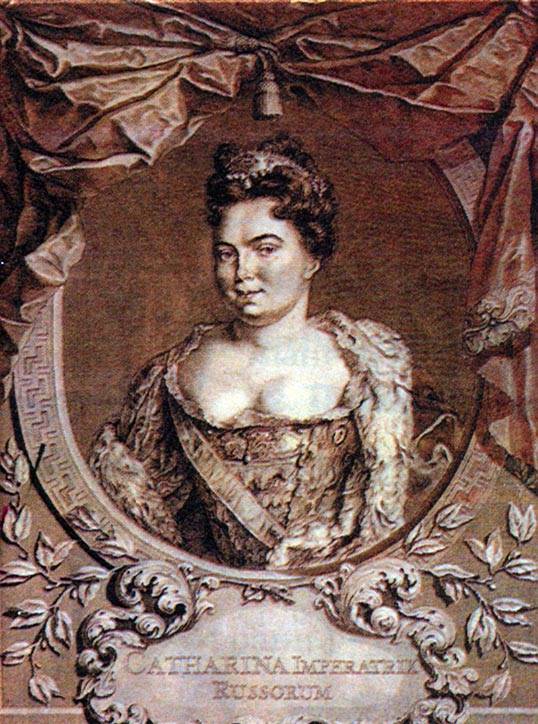
Ekaterina Alekseevna, engraving, 1724
Article "Russia on the way to the era of palace coups" we talked about the difficult relationships in the family of Peter I, his conflicts with his first wife and eldest son, which ended in the death of Tsarevich Alexei. The emperor's desire to transfer the throne to his youngest son, born of Catherine, was not realized due to the death of the latter, and Peter I again faced the question of an heir, which was never resolved by him until his death.
The fateful decree of Peter I
The result of the painful reflections of Peter I was the decree on succession to the throne, issued on February 5, 1722, which abolished the time-honored tradition of passing the throne down to direct male descendants by seniority. Now the current monarch of Russia could appoint anyone as his successor.
The emperor's plan, in general, was not bad. Indeed, you never know what a fool and degenerate the firstborn will be born? Wouldn't it be better to hand over the throne to the most prepared and capable candidate, whose reign will continue the traditions of the previous one?
However, as you know, the road to hell is paved with good intentions.
Firstly, the destruction of an ancient and universally recognized custom disorientated society, giving rise to the temptation of legitimate and not very candidates to take the throne precisely by the right of the most capable and powerful.
Secondly, it widened the already huge mental gap between the upper classes of society and ordinary people. The aristocrats now saw nothing wrong in not just “limiting the autocracy to a noose,” but also making good money on it, having received well-paid positions, orders and just money from the contender's accomplice serfs. However, the overwhelming majority of the country's population remained in line with traditional ideas. The uprising of Yemelyan Pugachev, for example, took place under the slogan of the return to power of the legitimate emperor Peter III, expelled from St. Petersburg by "the prodigal wife Katerina and her lovers." And some did not believe in the death of Peter II: they argued that the young emperor was captured and captured by his own courtiers for wanting to help ordinary people. The popular opinion about the "bad boyars", who prevented the "good tsar" from taking care of his subjects, became widespread and strengthened, and this increased the hostility of the peasants towards their masters and increased social tension in society.
Thirdly, for some reason it was not possible to achieve just the continuation of traditions and following in line with one policy under this system. Each new monarch from the Romanov dynasty now abruptly turned the state in the opposite direction to the one where his predecessor was trying to lead it. When studying Russian stories it is probably quite difficult for an outsider to believe that Peter III and Elizabeth, Paul I and Catherine II, Alexander II and Nicholas I, Alexander III and Alexander II are members of the same imperial house and close relatives. One involuntarily creates the impression that every time a change of power has taken place at the head of our country, if not a conqueror, then at least a representative of another, hostile dynasty.
Ironically, Peter I himself - the author of this famous decree, dying, failed to exercise the right to appoint an heir. Archbishop Feofan Prokopovich claimed that the last word of the emperor was "after": this was his answer to the question of whom he left his throne to. Even on the verge of death, Peter I could not dare to name his successor and in the end did not have time to express his will.
Better known is another, even more dramatic version of the circumstances of the death of the first emperor, which Maximilian Voloshin commented in white verses:
"Give it all ..." Fate added:
"... to dissolute women with their hahahals" ...
The Russian court erases all differences
Fornication, palace and tavern.
Queens are crowned king
By the lust of the guards' stallions.
And the first of these "crazy empresses" was the former port operator Marta Skavronskaya-Kruse, who is considered by some to be Swedish, while others are considered a German, Lithuanian or Latvian Courland. However, Polish origin is not excluded. Yes, and with her surname, everything is still not clear: it is known that Peter I also called Catherine Veselovskaya or Vasilevskaya, and some consider Rabe to be the maiden name of this woman.
Chosen One of Peter I
Peter I met the main woman of his life in the fall of 1703. Catherine at this time was 19 years old and she was no longer under Sheremetyev, but under Alexander Menshikov. Franz Villebois, author of the book "Stories of the Russian Court", claimed that it was then that the first "night of love" in their life took place, for which the tsar honestly paid 10 francs (half a louis). Villebois could learn about this both from Peter himself, to whom he was quite close, and from his wife, the eldest daughter of Pastor Gluck, in whose family Martha was raised.
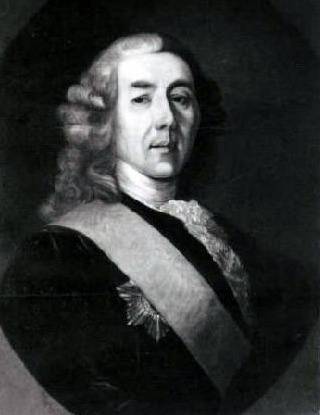
François Guillemot de Villebois, a French naval officer in the Russian service from 1698 to 1747. and rose to the rank of vice admiral. Portrait of the work of an unknown master
This episode of the "acquaintance" of Peter and Catherine (with the exception of payment for services rendered) was included in the novel by A. N. Tolstoy "Peter I" and the film of the same name based on this work. It is on the information of Villebois that Tolstoy relies when he tells how, in the presence of Menshikov, the tsar demands from Catherine "to give him a light in his bedroom."
Contrary to popular belief, Catherine after that did not immediately go to Peter I, and for two more years was in the service of the tsar's favorite, and Menshikov did not particularly distinguish her from others in the spring of 1705. The previous article quoted his letter demanding that Catherine be sent immediately, and not one - "with her other two girls." And this despite the fact that in 1704 and 1705. she gave birth to, unknown from whom (maybe from Menshikov, and maybe from the Tsar who periodically visited her) two boys: Peter and Paul, who died shortly after birth. Only in 1705, Peter I decided to take Catherine to himself, sending her to live in the estate of his sister Natalia (the village of Preobrazhenskoe). And only in 1707 (according to other sources, in 1708), she was converted to Orthodoxy, and her godfather was the Tsar's son Alexei - she received a patronymic by his name. And since 1709, Catherine was already almost inseparably with Peter, including in the Prut campaign, when she was in her seventh month of pregnancy. It is believed that the tsar could no longer do without Catherine, because she learned to shoot and relieve some attacks, during which Peter rolled on the floor, screamed with headaches and sometimes lost his sight. This was discussed in the article "Prut catastrophe of Peter I", we will not repeat ourselves.
Apparently, it was the moment of baptism that was key in the fate of Catherine, from that time the unprecedented rise of this metressa begins, which ended first in a secret (1711), and then an official (1712) wedding to Peter I, proclaiming her empress in December 1721 and coronation in May 1724.
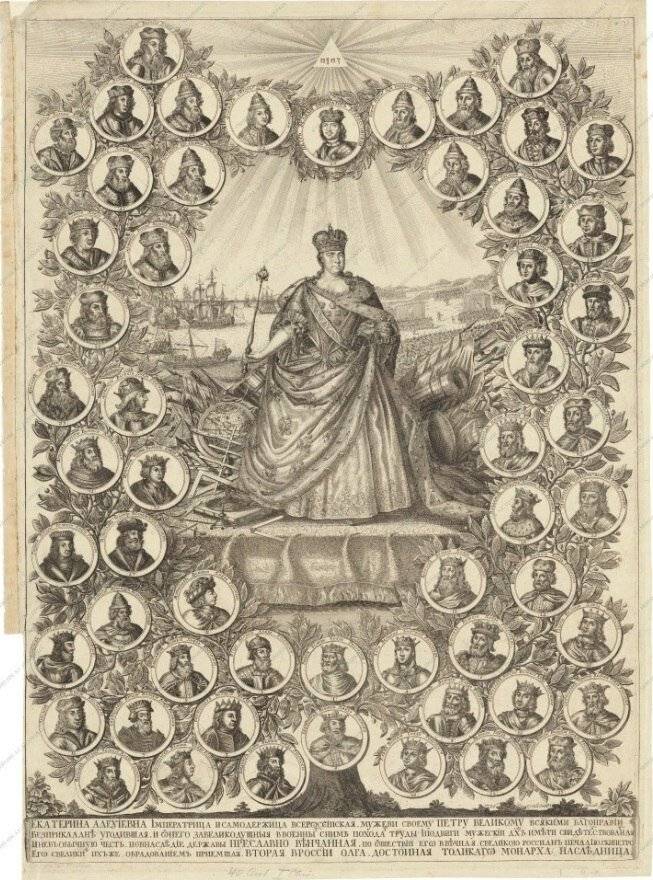
A. Zubov. Empress Catherine I surrounded by medallions with portraits of Russian tsars, 1725
At the same time, Catherine felt so free and confident that she got a lover, who became not just anyone, but Willem (Wilhelm) Mons. This was the brother of the famous favorite of Peter I - a guards lieutenant, a participant in the battles at Lesnaya and near Poltava, a former adjutant of the emperor, who in 1716 went into the service of Catherine. Later he was in charge of her office. In the service of Mons then there was a former solicitor and former guardsman Ivan Balakirev, to whom Peter the Great gave him the “amusing title” of the Kasimov Khan. In the future, Balakirev was destined to become famous as a jester at the court of Anna Ioannovna. Among other things, he is credited with the idea of playing strip cards. Empress Anna liked this proposal so much (she herself, of course, did not undress) that, as a reward, she ordered that Balakirev be allowed to go to dinner from the royal kitchen.
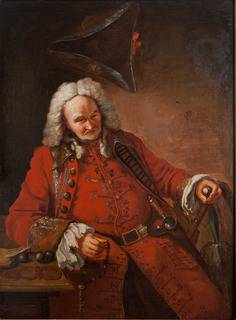
Jester Balakirev, portrait of an unknown artist, Travel Palace, Strelna
It was Balakirev who, in a fit of drunken frankness, told a certain student of the wallpaper master Ivan Suvorov that he was giving Mons Catherine's letters (and Mons’s letters to Catherine too). And these letters are so dangerous that if something happens, he can't even bear his head. Suvorov, in turn, shared the secret with a certain Mikhei Ershov, who wrote the denunciation.
Since one of these letters referred to some kind of drink, Willem Mons was initially suspected of wanting to poison the emperor. But the investigation revealed a completely different picture. It all ended with the execution of Willem Mons, whom, for the sake of decency, was accused only of bribery and embezzlement (which the favorite of Catherine also did not disdain, and even from the all-powerful Menshikov sometimes contrived "to take assistance"). Balakirev got off with three years of exile in Rogervik.
Already at the end of the 1880th century, the notorious Ekaterina Dashkova discovered some very high consumption of alcohol in the Academy of Sciences entrusted to her, and naturally, bad thoughts crept into the princess's head about the drunkenness of gentlemen academicians right at the workplace. However, the caretaker of the Cabinet of Curiosities Yakov Bryukhanov explained to her that alcohol is used to change the solution in glass vessels, where ... two severed human heads have been stored for half a century. Intrigued, "Ekaterina Malaya" raised the documents and found out that these were the heads of Willem Mons and Maria Hamilton (the mistress of Peter I, who was executed for infanticide). Empress Catherine II herself became interested in the "exhibits", who personally examined them, apparently glad to herself that her husband was the third Peter, and not the first. According to legend, it was she who ordered the heads to be buried in the basement. At least the historian Mikhail Semevsky in the XNUMXs. I have not found these heads in the storage rooms of the Cabinet of Curiosities.
But let us return to Catherine I and see that Peter did not part with her then, although he cooled off. And shortly before his death, daughter Elizabeth managed to completely reconcile the spouses.
The relationship between Catherine and Mons had far-reaching consequences. In November 1724, Peter I finally agreed to marry the Holstein Duke Karl Friedrich with his eldest daughter, the clever Anna (it would be much better for Russia if it was she who stayed at home, and the "cheerful" Elizabeth left for Kiel).
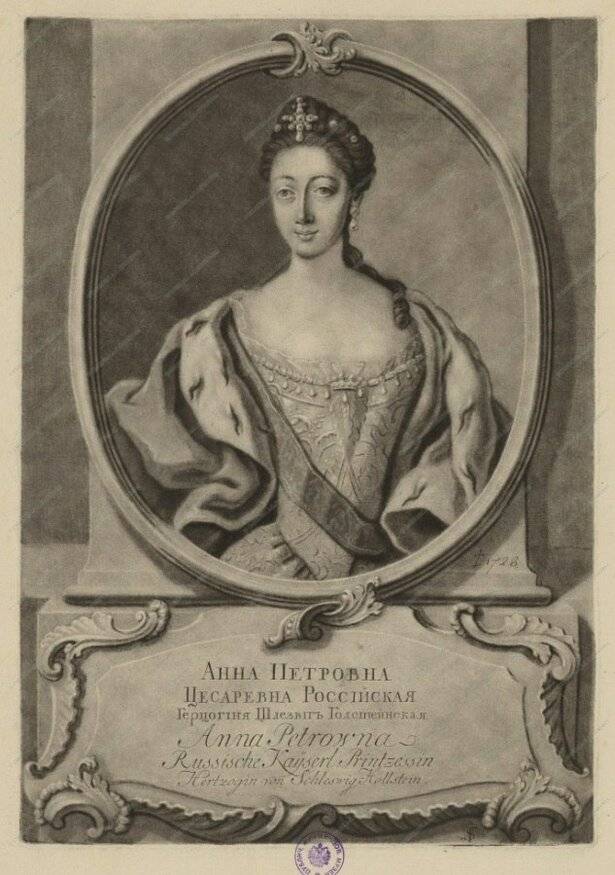
A. Zubov. Portrait of Anna Petrovna
At the same time, a secret protocol was signed, according to which Peter had the right to take the son born of this marriage to Russia in order to make him the heir to the Russian throne. And the son of this couple was really born, and indeed became both the heir to the throne and the Russian emperor, but was killed after a palace coup in favor of his wife, the German woman Sofia Augusta Frederica of Anhalt-Zerbst, who went down in history under the name of Catherine II. You probably guessed that we are talking about Peter III. But that was still far away.
The first autocratic ruler of the Russian Empire
After the death of Peter I, two parties were formed at the Russian court. The first of them, which, perhaps, can be tentatively called "aristocratic" or "boyar", advocated the proclamation of the new emperor as the undisputed contender - Peter Alekseevich, son of Tsarevich Alexei and grandson of Peter I, who was the last descendant of the Romanov family in the male line. The second party, which included "new people" who had come forward under the deceased emperor, supported the candidacy of his wife Catherine. It was then that the Russian guards for the first time changed the fate of Russia, and the announcement of Catherine I as the autocratic empress can be considered the first palace coup in Russian history. This coup was bloodless and was not accompanied by repressions, but, as they say, it was the beginning of the trouble.
A huge role was then played by Alexander Menshikov, who was able to quickly organize a "support group" of soldiers of the guards regiments.
Outraged Field Marshal A.I. Repnin, a supporter of Pyotr Alekseevich, who was then president of the Military Collegium, tried to find out who dared to withdraw the regiments from the barracks and send them back without his order. But it was too late: the guards who entered the hall of the Winter House of Peter the Great promised to "split the heads" of those "boyars" who refused to vote for "Mother Ekaterina", and the electors did not wait until the "guard" was finally "tired."
So Catherine I, who did not have even the slightest talent as a statesman, ended up on the Russian throne. And she never felt the desire to somehow participate in governing the country. To manage the state, the so-called Supreme Privy Council was created, in the affairs of which the new empress never interfered. She had other concerns and interests.
When Peter I was alive, Catherine had to somewhat moderate her instincts and appetites, but now she has turned into some kind of automaton for the continuous consumption of all kinds of benefits, pleasures and entertainment. Catherine I spent the rest of her life at balls and at the dinner table. Suffice it to say that 10% of all Russian budget funds were then spent on the purchase of Tokay wine for the royal court. In total, more than 6 million rubles were spent on the needs of the new empress and her inner circle - the amount at that time was simply astronomical. No wonder I.M. Vasilevsky called Catherine
\
The French envoy, Jacques de Campredon, wrote about how Empress Catherine spent her time:
M. Magnan, who replaced Campredon in 1726, reported to Paris that Catherine "as usual goes to bed no earlier than 4-5 o'clock in the morning."
Catherine did not forget about carnal pleasures, in which she undertook to help first the chamberlain Reingold Gustav Levenwolde, and then the young Polish Count Peter Sapega (previously listed as the groom of Maria Menshikova).
The result of this intemperate lifestyle was an early death at age 43 (May 6, 1727).
Alexander Menshikov, the de facto ruler of Russia at the time, watched with alarm the rapid decrepitude of Catherine. Realizing that the empress's time was coming to an end, this time he decided to stake not on Catherine's daughter Elizabeth, but on her stepson, 11-year-old Pyotr Alekseevich, under whose death sentence he once put his signature on his father. Of course, he now supported the legitimate heir by no means out of considerations of altruism and not in order to correct the injustice committed against this young man. At Menshikov's insistence, shortly before his death, Catherine I made a will, according to which Peter was declared the heir to the throne, but under the tutelage of the Supreme Council, the main role in which Menshikov himself played. And even more than that, the Serene One literally went all-in, swung to the throne of the Russian Empire, which his daughter was supposed to occupy. To do this, she should have become the wife of the new emperor: the goal, according to Alexander Danilovich, is quite real and achievable. And so he refused to marry his daughter not only to Peter Sapieha, but also to the crown prince of the German royal house of Anhalt-Dessau. In general, it turned out funny with the prince: Alexander Danilych refused him on the grounds that there was a case of one of the members of this dynasty marrying the daughter of a pharmacist. However, this time, luck turned away from the "darling of fate." And the crown did not bring happiness to the young Peter Alekseevich, the imperial mantle became his shroud. But we will talk about this in the next article.
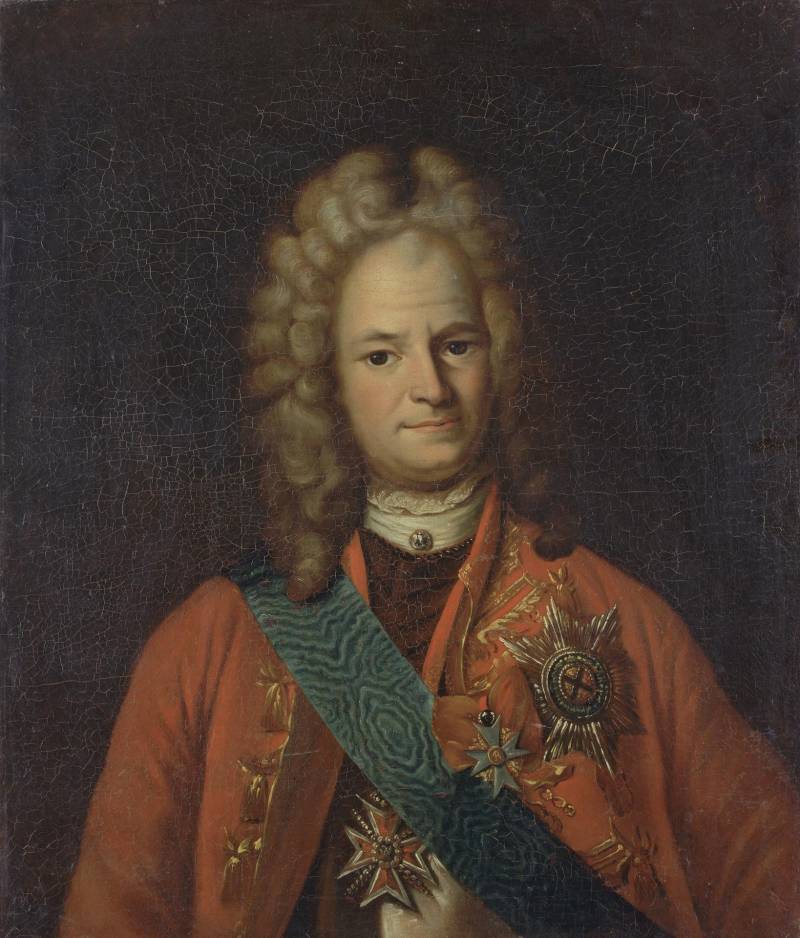
Information